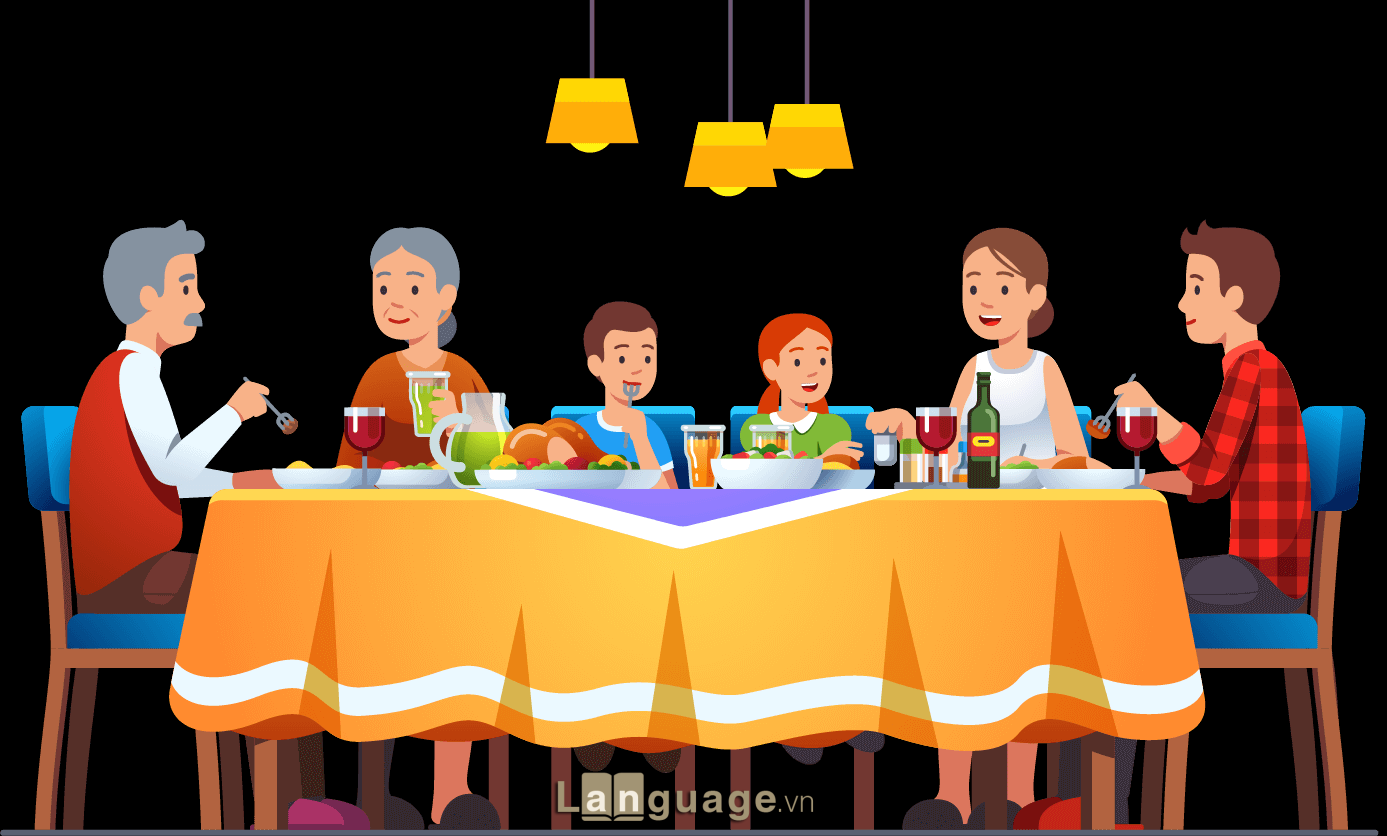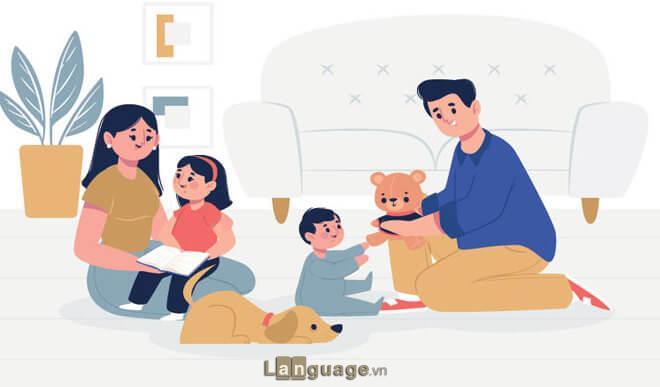Từ vựng IELTS chủ đề Family là một trong những phần vô cùng quan trọng để có thể đạt điểm cao trong phần thi IELTS Speaking. Nếu bạn vẫn chưa tự tin vào vốn từ vựng của mình thì hãy cùng Language.vn học ngay ở bài viết dưới đây nhé!

Nội dung
- 1 1. Từ vựng IELTS chủ đề Family
- 1.1 1.1. Các loại Gia đình – Types of Family
- 1.2 1.2. Các thành viên trong gia đình – Family Members
- 1.3 1.3. Quan hệ họ hàng – Extended family
- 1.4 1.4. Gia đình thông gia – In-laws
- 1.5 1.5. Gia đình có cha hoặc mẹ kế – Stepfamilies
- 1.6 1.6. Nuôi dạy con cái – Parenting
- 1.7 1.7. Các thế hệ – The Generations
- 1.8 1.8. Một số từ vựng khác – Other vocabulary
- 2 2. Thành ngữ về chủ đề Family
- 3 3. Phrasal verb chủ đề Family
- 4 4. Danh từ liên quan đến chủ đề Family
- 5 5. Động từ liên quan đến chủ đề Family
- 6 6. Các câu hỏi IELTS Speaking chủ đề Family
1. Từ vựng IELTS chủ đề Family
1.1. Các loại Gia đình – Types of Family
- Family – a group of people who are related to each other: Gia đình
- Immediate family – your closest relations, such as your parents, children, husband or wife: Gia đình ruột thịt (bao gồm ba, mẹ & anh chị em ruột)
- Dysfunctional family – a family that is not behaving or working normally, where there is conflict, misbehaviour, etc.: Gia đình không êm ấm (các thành viên trong gia đình không yêu thương nhau, hay tranh chấp, cãi vã…)
- Extended family – a family unit that includes grandmothers, grandfathers, aunts, and uncles, etc. in addition to parents and children: Gia đình mở rộng (bao gồm ông bà, cô chú bác, cậu, mợ… )
- Nuclear family – parents and their children: Gia đình hạt nhân (gồm có bố mẹ và con cái)
1.2. Các thành viên trong gia đình – Family Members
- To be related to – to belong to the same family as: Có quan hệ họ hàng
- A relative – someone who is part of your family: Người thân trong họ hàng
- Blood relative – someone you are related to through birth rather than marriage: Có quan hệ ruột thịt
- Next of kin – the person or group of people you are most closely related to: Thân nhân gần nhất
- Descendants – a person who is related to you and who lives after you, such as your child or grandchild, and all future generations: Con cháu
- Ancestors – family members from past generations: Tổ tiên
- Father – a man in relation to his child or children: Bố
- Little sister / younger sister (or brother) – younger than you: Em gái (em trai)
- Mother – a woman in relation to her child or children: Mẹ
- Daughter – a person’s girl child: Con gái
- Parent – father or mother: Bố mẹ
- Identical twins – twins who look exactly the same: Cặp song sinh giống hệt nhau
- Husband – the male partner in a marriage; a married man: Chồng
- An only child – a child who doesn’t have any brothers or sisters: Con một
- Wife – the female partner in a marriage; a married woman: Vợ
- Distant relative – generally, a relative who is a third cousin or greater, or a great aunt or uncle, especially when you have little or no involvement with him or her: Họ hàng xa
- Spouse – a husband or wife: Vợ/chồng
- Household – all the people who live in one house: Hộ gia đình
- Son – a person’s boy child: Con trai
- Big brother / older brother (or sister) – older than you: Anh trai (chị gái)
- Sibling – a brother or sister: Anh chị em
- Twin – either of two children born to the same mother on the same occasion: Sinh đôi
1.3. Quan hệ họ hàng – Extended family
- Grandson – the son of your son or daughter: Cháu trai
- Aunt – the sister of your mother or father: Cô/dì
- Niece – the female child of your brother or sister: Cháu gái
- Uncle – the brother of your mother or father: Chú/bác
- Cousin – a child of your uncle or aunt: Anh chị em họ
- Grandfather – the father of your mother or father: Ông
- Nephew – the male child of your brother or sister: Cháu trai
- Grandmother – the mother of your father or mother: Bà
- Grandchildren – the children of your children: Cháu
- Grandparents – the parents of your parents: Ông bà
- Granddaughter – the daughter of your son or daughter: Cháu gái
1.4. Gia đình thông gia – In-laws
- In-laws – the relatives of your husband or wife: gia đình thông gia
- Father-in-law – father of your spouse: bố chồng
- Brother-in-law – the husband of your sister: anh rể
- Son-in-law – the husband of your daughter: con rể
- Mother-in-law – mother of your spouse: mẹ chồng
- Daughter-in-law – the wife of your son: con dâu
- Sister-in-law – the wife of your brother: chị dâu
1.5. Gia đình có cha hoặc mẹ kế – Stepfamilies
- Stepfather – the husband of your mother, but not your biological father: Cha dượng
- Half-brother – a brother you have only one parent in common with: Anh (em) trai cùng cha khác mẹ/cùng mẹ khác cha
- Stepson – the son of your new wife or husband, but not your biological son: Con trai riêng của vợ hoặc chồng
- Stepmother – the wife of your father, but not your biological mother: Mẹ kế
- Stepsister – the daughter of your stepmother or stepfather: Con gái của mẹ kế/cha dượng
- Half-sister – a sister you have only one parent in common with: Chị (em) gái cùng cha khác mẹ/cùng mẹ khác cha
- Stepdaughter – the daughter of your new wife or husband, but not your biological daughter: Con gái riêng của vợ hoặc chồng
- Stepbrother – the son of your stepmother or stepfather: Con trai của mẹ kế/cha dượng
1.6. Nuôi dạy con cái – Parenting
- Family life – the kind of life a person normally leads when they are married and have children: Cuộc sống gia đình
- Family man – a man who enjoys being at home with his wife and children: Người đàn ông của gia đình
- To start a family – to have children: Có con
- Fatherhood – the state of being a father: Làm cha
- Offspring – a person’s child or children: Con cái
- To raise (a child) – to take care of a child until they become an adult: Nuôi một đứa trẻ
- Motherhood – the state of being a mother: Làm mẹ
- To bring up (a child) – to raise a child: Nuôi một đứa trẻ
- Spoilt child – a child who shows bad behaviour because they have been allowed to do or have anything they want: Đứa trẻ hư
- Stay at home parent / stay at home mum – a parent who stays at home to take care of their children rather than going out to work: Cha/mẹ không đi làm mà ở nhà chăm con
- Upbringing – the way in which you are treated and educated when young, especially by your parents: Sự nuôi dưỡng, dạy dỗ
- Strict – strongly limiting someone’s freedom to behave as they wish, or likely to severely punish someone if they do not obey: Nghiêm khắc
- Breadwinner – the member of a family who earns most of the money that the family needs: Trụ cột gia đình
- To adopt – to legally take another person’s child into your own family and take care of them as your own child: Nhận nuôi
- Over-protective parents – a parent who protect their child too much: Cha mẹ kiểm soát con quá đà
- Dependant – someone who depends on you for financial support, such as a child or family member who does not work: Người phụ thuộc
- Single parent – a person bringing up a child or children without a partner: Cha/mẹ đơn thân
- To foster – to take care of someone else’s child, usually for a limited time, without becoming the child’s legal parent: Chăm sóc một đứa trẻ, thường trong một thời gian nhất định, mà không trở thành cha mẹ hợp pháp của con
- To look after – to take care of: Chăm sóc
- To give birth – to have a baby: Sinh con
- To support (a family) – to have enough money to be able to look after a family: Hỗ trợ gia đình
- Childcare – the care of children, especially by a crèche, nursery or childminder while parents are working: Chăm sóc trẻ em
- Authoritarian – demanding that people obey completely and refusing to allow them the freedom to act as they wish: Độc đoán
1.7. Các thế hệ – The Generations
- Older generation – people of middle-age and older: Thế hệ già
- Generation gap – a difference of opinions between one generation and another regarding beliefs and attitudes, often leading to a lack of understanding between them: khoảng cách thế hệ
- Adolescent – a young person who is developing into an adult: Thanh niên
- Teenager – a person aged between 13 and 19 years: Thiếu niên
- Younger generation – young adults, teenagers and children: Thế hệ trẻ
1.8. Một số từ vựng khác – Other vocabulary
- Family ties – the sense of connection between family members: Quan hệ gia đình
- Family gathering / family get-together – an informal event where family members meet up: Sum họp gia đình
- Family background – the details of a person’s family regarding education, social status, etc.: Nền tảng gia đình
- Black sheep (of the family)– someone who brings shame to their family by being different or doing something wrong: Người khác biệt với các thành viên trong gia đình
- Childhood – the time when someone is a child: Thời thơ ấu
- Run in the family – a common feature in a family; something which is passed from parents to children: Tính cách chung mà tất cả các thành viên trong gia đình đều có
- Hereditary – passed from the genes of a parent to a child: Di truyền
- To care for – to provide the things someone needs, especially someone who is young, old, or ill: Chu cấp
- A widow – a woman whose husband has died: Góa phụ
- Sibling rivalry – the feeling of competitiveness that often exists between brothers and sisters: Anh chị em ruột
- A widower – a man whose wife has died: Người đàn ông góa vợ
- Close-knit – involving groups of people in which everyone supports each other: Gần gũi
- Get on with / get along with – to like someone and have a friendly relationship with them: Có mối quan hệ tốt đẹp
- Wears the trousers – to be the person in a family who holds the authority and makes decisions: Người có quyền lực trong gia đình
- To fall out with / to have a falling out – to have a disagreement which ruins a relationship with that person: Tranh cãi với ai
- On speaking terms – friendly enough to talk: Quen biết ai có thể chuyện trò với nhau được
- To look alike – to look very similar to someone else: Giống nhau
- A chip off the old block – the person is very similar (in character and personality) to one of their parents: Rất giống bố hoặc mẹ
- To follow in someone’s footsteps – to do the same thing as someone else did previously, especially someone in your family: Tiếp nối truyền thống gia đình
- To take after (someone) – to be very similar to an older family member: Giống ai đó trong gia đình
- Spitting image – to look extremely similar to someone: Phiên bản giống hệt
- To desert – to leave someone without help or in a difficult situation and not come back: Bỏ rơi

2. Thành ngữ về chủ đề Family
- To have a falling out: Tranh cãi, cãi vã và gây tổn hại đến các mối quan hệ.
- Pride and Joy (Niềm tự hào, niềm hạnh phúc): Chúng ta cũng có thể sử dụng thành ngữ này để nói về một điều (sở thích, sở hữu, v.v.) khiến ai đó có cảm giác tương tự.
- Get along with/Get on with (Hoà hợp với ai đó): Yêu quý nhau và có mối quan hệ rất thân thiện.
- Breadwinner: Trụ cột gia đình
- To wear a pants: Người nắm quyền trong nhà
- (Just) one big happy family: Một đại gia đình hoà hợp và yêu quý nhau. Nhưng đôi khi cụm từ này có thể sử dụng theo hàm ý mỉa mai.
- The apple of one’s eye (người được yêu mến): Chúng ta thường sử dụng thành ngữ này để nói về tình cảm cha mẹ dành cho con của họ.
- Bad blood: Mối quan hệ không tốt
- To rule the roost: Người chịu trách nhiệm chính
3. Phrasal verb chủ đề Family
- Take after: trông giống
- Get married to sb: cưới ai làm chồng/vợ
- Give birth to: sinh em bé
- Take care of = Look after : chăm sóc
- Propose to sb: cầu hôn ai
- Get along with somebody: hoàn thuận với ai
- Run in the family: cùng chung đặc điểm gì trong gia đình
- To have something in common: có cùng điểm chung
4. Danh từ liên quan đến chủ đề Family
- Family trait: Đặc trưng của gia đình
- Close-knit family: Gia đình có quan hệ khăng khít
- Deprived home: Gia đình nghèo khó, thiếu thốn
- Healthy ralationship: Mối quan hệ tốt đẹp
- Step-brother/sister: Anh chị em là con của bố/mẹ kế
- Trial separation: Thử sống ly thân
- Siblings: Anh chị em ruột
- Stable home: Gia đình yên ấm
- Cousins: Anh chị em họ
- Step father/mother: Bố/ mẹ kế
- Only/Middle child: Con một
- Ex-husband/ex-Wife: Chồng/vợ cũ
- Ralatives: Anh em nói chung
5. Động từ liên quan đến chủ đề Family
- To have a lot in common: Có cùng sở thích
- To drift apart from: Trở nên xa cách với ai
- To have children: Có con
- To bring up/ raise/ to nurture: Chăm sóc nuôi nấng con cái
- To start a family= To settle down: Ổng định, gầy dựng gia đình
- Divorce: Ly hôn
- To enjoy someone’s company: Thích ở cùng ai đó
- The coming of a new member: Sự hiện diện của một thành viên mớ
- To get on well with: Hiểu rõ ai
- To lose touch with: Mất liên lạc với ai
- To expect a baby: Mang thai
- To get to know: Bắt đầu biết ai đó
- To fall out with: Xảy ra tranh cãi
- To keep in touch with: Liên lạc với ai
- To be well matched: Hợp ai đó
- To fall for: Yêu ai đó
6. Các câu hỏi IELTS Speaking chủ đề Family
6.1. Part 1
- Do you have a large or small family?
I come from a large family. Now, I just have my mom, an older brother and three younger brothers. My father passed away 17 years ago. I am the only daughter in the family. - How much time do you spend with your family?
For now, I live one in another city far from my family so I only spend about two weeks each year with them. - What do you like to do together as a family?
My family enjoys cooking together and having special meals together. We catch up and talk about our lives. We look back and share memories especially when we were still young. We enjoy music as well. So, when we get together, we play several musical instruments and sing along. - Do you get along well with your family?
Sure. We are really close to each other. I am happy that I could tell them anything. They are always there to listen when I have problems. - Is yours a typical family?
Well, I can say that, yes, our family is a typical one. A family, who stays by each other through good times and bad times. - Are there many different types of family in your country?
Yes, types of family in terms of number and the members of a household. There are small families with one two children to large families with about eight or more children. There are also households with extended families. - Who are you closest to in your family?
I am closest to my mom. I think it is because we are the only women in the family. So, we share the same ideas about many things.
6.2. Part 2
Describe the person in your family who you most admire. You should say:
- what their relationship is to you
- what they have done in their life
- what they do now
- and explain why you admire them so much.
Sample answer:
The person I admire the most, not just in my family but in the whole world is my mom. She is a great wife and a wonderful mother. She is loving, caring, open-minded and very understanding.
I love how she looks at things. She is very optimistic. I love her courage in raising me and my brothers well since my father passed away. She has been a single mom for about 17 years and did her best to act both a mother and a father to us. She’d always stood up for us.
My mom resigned from work few years after my father died. Her reason was to spend much more time for the family especially when we were growing up. She felt the need to guide us physically and emotionally. She then started her own business which she is still running till now.
I love her so much. She is not just a mom but also a mentor and a friend.
Describe a family celebration that you remember. You should say
- what you were celebrating
- who was present
- what you and your family did to make the celebration special
- and why you enjoyed the occasion.
Sample answer:
I’m going to describe my sister’s wedding day, which took place a few years ago in the town where I grew up. For my sister it was the biggest and most important day of her life.
I think there were around 100 people at the marriage ceremony, which was held in a church. Even more people came to the party, or the wedding reception as we call it, after the ceremony. Of course, most members of my family were there, as well as the groom’s family and a collection of the bride and groom’s friends and colleagues.
To make the celebration special, we did what families normally do. My mother made sure that the church and the reception venue were nicely decorated – there were flowers everywhere! Obviously we all dressed for the occasion, and there were bridesmaids, gifts, a huge wedding cake, and so on.
I enjoyed the occasion because it was great to see my sister so happy on her big day. The ceremony was perfect, and we all had a fantastic time at the reception. It’s rare for me to see all of my family and friends together in one place, so that’s probably what made the day so memorable for me.
6.3. Part 3
- In what ways have families in your country changed in recent?
The roles of husbands and wives changed in recent years. Both spouses have been more open to perform different roles such as working outside the home or pitching-in with the household duties. Another change I think is limiting the number of children in the family. Parents nowadays think of having smaller families due to high cost of living. - Should husbands and wives have different roles within the family? Why (not)?
Traditionally, husbands and wives had clear-cut roles in the society. Husbands used to provide the financial need of the family, while women were expected to take care of the house. Changes had occurred over time and both husbands and wives started to take part in each of these roles. I think this change is good. It is not necessary to define each role. I think whatever role each husband or wife takes, as long as it is good for the family, it is okay. - Which are more important to you: your family or your friends?
Both are important but family is more important for me than friends. Friends may come and go but I know that my family is always there and will always be there no matter what happens in my life and no matter what decisions I take.

Trên đây là 155+ từ vựng IELTS chủ đề Family mà Language.vn muốn chia sẻ với các bạn. Hy vọng đã giúp các bạn trao dồi thêm vốn từ vựng của mình để có thể đạt điểm cao trong các kỳ thi nhé!



